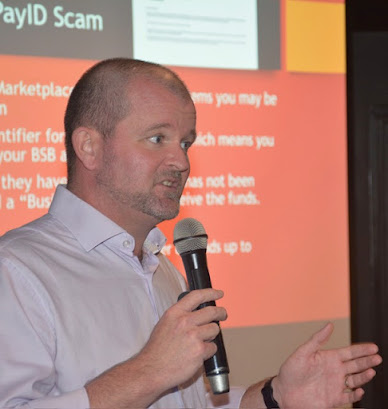SCAM AWARENESS - we all can benefit!
One June 6, 2023, Thomas Shanahan gave a highly informative talk on scam awareness to club members and guests. Thomas was accompanied by Maggie, his Mum who was a member of the club before moving out of the area.
 |
| Thomas Shanahan |
Thomas worked for the professional association for Australia’s technology sector for more than 5 years, specialising in media and community engagement around technology and teaching people how to boost their online security. He holds Microsoft certifications in Cybersecurity advocacy and has presented to community groups using resources from the eSafety Commissioner, along with speaking at national and international events.
Many scams are getting harder to recognise, the techniques often used are very advanced or sophisticated and people find it hard to understand or pick that they were not genuine.
Thomas started with some examples of genuine and scam text messages and how to pick the difference. If no action is required (e.g., no requirement to click any links- sufficient information is given), it is most likely genuine, however, if action like clicking the link is required to further obtain the info - assume it is a scam. Even some with mobile numbers provided are often a scam.
Scam techniques used by cyber criminals include Phishing and Malware. The scammer attempts to take your information and build your digital profile in order to fraudulently obtain money, take out credit in your name, transfer property out of your name or disrupt your life or business.
Phishing Scamwatch has been receiving a lot of reports about phishing scams. A driving factor is the inundation of ‘flubot’ scams. They are an attempt to get your information but sending messages with links from what appear genuine organisations.
Malware scams infect your phone using a doggy link and can steal your contacts and banking info.
Thomas outlined several case studies of possible scams that we might encounter as we move to a text and email-based economy for many transactions.
PayPal
 |
| PayPal Scam |
An example of a romance dating scam and promising investment returns. The victim after meeting on WhatsApp, eventually provided Driving licence ID and Banking details and
made regular deposits and received regular updates on the profitability and performance of the investment portfolio. When he tried to withdraw some funds he quickly realised that he had lost over $500,000.
Website takedown:
• Scamwatch received a number of reports about a website called TradeCapitalFX.
 |
| The fake website - very real appearance. |
• People had been scammed after using the site to buy bitcoins.
• Victims were unable to withdraw their profits after making initial investments or were asked to pay additional fees in order to have their funds released.
• $9,000 in losses to this scam site were reported in May, so the Scamwatch team decided to take action.
The TALK method to act on scams:
• T: Talk to your friends, family, neighbours, colleagues about a scam you’ve come across, and share information.
• A: Ask a simple question, like “have you ever been scammed?” or “what’s your top tip for avoiding scams?” to get the conversation started. You could even ask “have you received any of these flubot scam texts?”
• L: Listen. Sharing scam stories and experiences is helpful. Create a safe space for someone you know to talk to you about scams.
• K: Keep talking! Awareness is our biggest defence against scams. So TALK to as many people as you can about scams!
Where to go to:
• Report to Scamwatch - https://www.scamwatch.gov.au/report-a-scam
• If you have lost money to a scam, contact your bank or financial institution as soon as possible - the Australian Banking Association provides a summary of steps for consumers when making a complaint to their bank. If you are not satisfied by the response from your bank, you can make a complaint to the Australian Financial Complaints Authority.
• If you have lost personal information and you are concerned your identity may be compromised, you can contact ID Support NSW http://nsw.gov.au/id-support-nsw
• Consider contacting the platform on which you were scammed to report the scam –https://www.scamwatch.gov.au/get-help/where-to-get-help#report-scams-to-facebook-services
• If you or someone you know is experiencing anxiety, emotional concerns or distress about scams, contact Lifeline on 13 11 14 or Beyond Blue on 1300 22 4636.
The club thanked Thomas for his very informative and beneficial presentation.

Secretary Lindy, Thomas and President Rick





Comments
Post a Comment